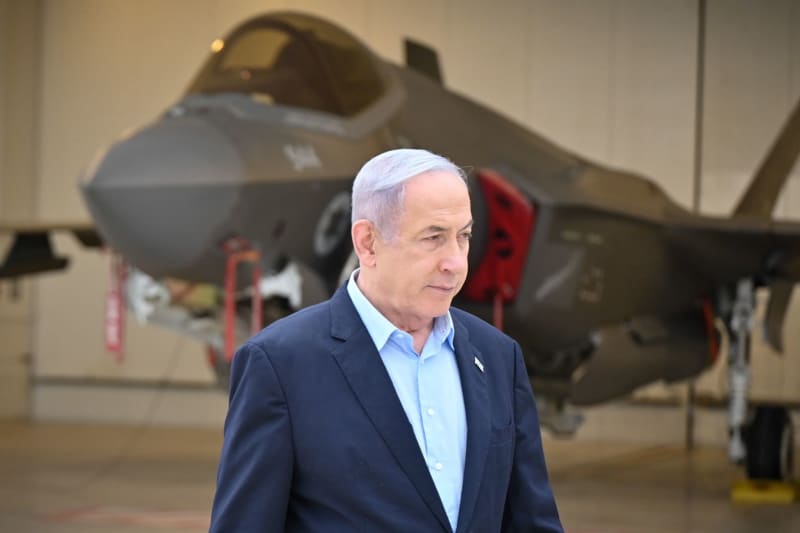Medicines could soon be on their way to Israeli hostages held by Hamas in the Gaza Strip under a Qatar-mediated deal that also provides for more aid to Palestinians in the territory.
Two planes carrying food and medicine from Qatar and France landed in the Egyptian coastal town of al-Arish on Wednesday, a representative of the Egyptian Red Crescent said.
Israeli Prime Minister Benjamin Netanyahu’s office said earlier that that medicine from France would be flown to Egypt on board two Qatari military aircraft. From there, they will be transported to Gaza.
Broadcaster Al Jazeera, citing the French Foreign Ministry, reported that 45 hostages were to receive three months’ worth of medication for the treatment of their chronic illnesses.
An Israeli government spokesman has said that a third of the remaining 132 hostages suffered from chronic medical conditions.
Mousa Abu Marzouk, a senior political leader of the Palestinian militant group Hamas, wrote on social media that Hamas had set several conditions before agreeing to the Qatar-brokered deal.
He said Hamas demanded that for every box of medicine intended for the hostages, a thousand boxes of medicine be delivered to benefit Palestinian civilians in the devastated Gaza Strip.
A further condition is that Israel’s army does not inspect the medicine deliveries.
But the Israeli COGAT authority, which is responsible for contacts with the Palestinians and humanitarian aid, will go ahead an inspect the shipments, which are to be transported via several lorries, reported the Times of Israel.
Israeli media had previously speculated as to whether the deliveries would be inspected or not.
As a matter of course, Israel insists on inspecting all aid shipments before they are brought to Gaza, as there are fears that weapons could be smuggled in.
The supply of chronically ill hostages with necessary medication had been under negotiation for weeks. Al Jazeera reported Hamas feared that the medical aid could be prepared in such a way that it could be tracked and Israel could find out where the hostages are.
According to Israeli government figures, 253 people were abducted in the Gaza Strip during the raid and massacre by the Hamas and other Palestinian militants on Israel on October 7. Currently, 132 people are still being held. Israel believes 27 of them are no longer alive.
In southern Gaza, a field hospital set up by Jordan to treat the wounded has been severely damaged by Israeli fire, according to the Jordanian army.
One member of staff and a man being treated in the intensive care unit at the hospital in Khan Younis were injured, the Jordanian army said.
Israel bears “full responsibility for the safety of the hospital staff,” it added.
The total number of people killed in Gaza since the start of the war has risen to 24,448, the the Hamas-run health authority said on Wednesday, adding that 61,504 people have been injured.
Gaza’s telecommunications services were down for the sixth day in a row. It is the longest-running disruption since the war’s start, the internet monitor NetBlocks said.
Paltel, the communications company based in the West Bank, reported last Friday that all communications and internet services in the were no longer functioning in Gaza. It cited the “ongoing aggression” by Israel as the cause.
More than 100 days after the start of the Gaza war, several Hamas leaders remain in hiding the Gaza Strip despite the intense Israeli military ground and air offensive.
They are believed to be in the huge network of underground tunnels Hamas had dug over the year. The Israeli army’s main focus is on Yehya al-Sinwar, who is the head of Hamas in the Gaza Strip.
A Hamas source told dpa in Beirut on Wednesday that Gaza is their land and that the group’s senior members have no intention of leaving.
“It’s either victory or martyrdom,” the source said.
Violence in the Israeli-occupied West Bank has surged in parallel with war in Gaza.
Israel’s army said it has killed the leader of a militant cell in the West Bank which was planning a “large-scale terrorist attack” on Israel.
The Israel Defense Forces (IDF) said that Abdullah Abu Shalal “was eliminated during a precise airstrike.”
Abu Shalal was the head of the “terrorist infrastructure in the Balata [refugee] camp” in Nablus, the IDF said.
Three Palestinians were killed in the Israeli drone attack on the Balata camp, according to the Palestinians.
According to the al-Aqsa Martyrs’ Brigades, which is close to the Fatah party of Palestinian President Mahmoud Abbas, the three people killed were members of the armed group.
They mentioned three names, but Abu Shalal’s was not among them. His family reportedly denied his death.
The Israeli army said Abu Shalal was responsible for carrying out several attacks over the last year, including a shooting in Jerusalem that left two injured and the bombing attack on the IDF in October in which a soldier was injured
The IDF wrote that the cell was financed and directed by Iranian sources.
Elsewhere in the West Bank, four people were killed in in the town of Tulkarm. The dead were killed in a drone attack, the Palestinian Red Crescent said.
The Israeli army said its forces had been carrying out a “counterterrorism operation” in a refugee camp in the city when shots were fired at officers and explosive devices thrown.
The Israeli force then opened fire and also attacked from the air, resulting in several armed people killed.
It was initially unclear whether the dead belonged to an extremist group.
The army said one military reservist was injured during the operation. The Palestinian Red Crescent said two paramedics were also injured when their ambulance was hit by a drone attack.
Witnesses reported that the Israeli army had completely destroyed the main road in the refugee camp.


